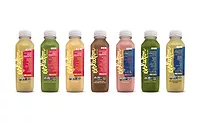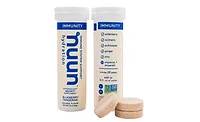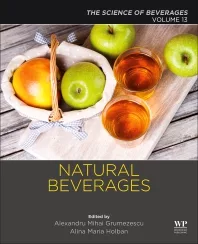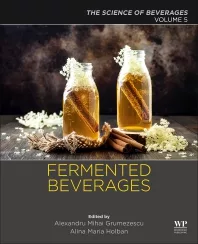Moms, millennials drive immune-supporting beverages
Consumers looking for convenient immune health maintenance
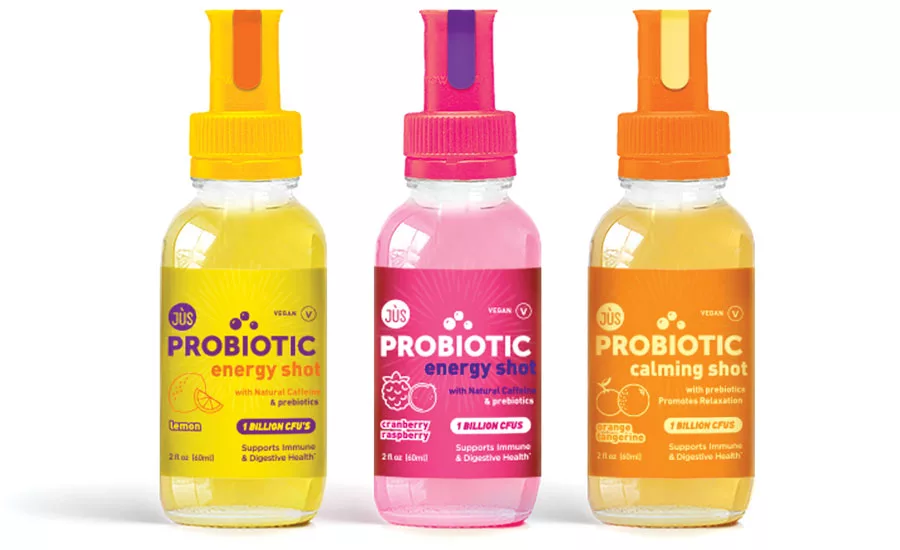
Probiotics, like GanedenBC30, have been proven to support immune health through their support of digestive health. Jús by Julie’s Probiotic Energy and Calming shots contain GanedenBC30. (Image courtesy of Jús by Julie)

With the emergence of bottled water as the No. 1 most-consumed beverage and the growth of better-for-you products like cold-pressed juices and ready-to-drink teas, it’s clear that many consumers are becoming more aware of their everyday health. In line with this trend, consumers have become more aware of the importance of supporting their immune systems on a consistent basis as a way to prevent illness before it happens.
“It’s no secret that consumers are turning to a more proactive approach to their health and wellness, and they are turning to functional beverages to do so,” says Donald Cox, research and development director for Wellmune at Beloit, Wis.-based Kerry. “For example, according to a GlobalData survey (2014), 60 percent say they actively use food and beverages to improve their health, and 30 percent consume food and beverages that deliver a particular benefit at least once a week. This progressive approach to health and wellness is also bringing long-term immune health to the forefront of consumer concerns.”
Ramesh Thiyagarajan, senior marketing manager at DSM Nutritional Products, Parsippany, N.J., notes that consumers have made it a goal to be proactive in their health.
“As U.S. healthcare costs rise and as access to quality healthcare becomes increasingly complex, consumers are empowering themselves to be more proactive in managing their health,” he explains. “Maintaining a healthy immune system is critical to this goal.”
Along with their increasing demand for immune-supporting food and beverages, consumers are looking for simple solutions, Kerry’s Cox adds.
“In the immune health beverage space, convenient and easy-to-use products are market winners,” he says.
Mike Bush, chief executive officer at Mayfield Heights, Ohio-based Ganeden Inc. and executive board president of the International Probiotics Association, notes that the market for immune health products has grown as a result of a few core consumer groups.
“[W]e’ve seen an increased demand in the mom-purchased immune products, so primarily products for kids we’re seeing a big uptick in,” he explains. “And then we’re seeing increased interest in immune health in general from the general public as they understand more fully the correlation between the gut and immune system. As probiotic marketers and other companies talk about the gut-immune relationship, you’re starting to see that resonate with buyers, in particular millennials and moms.”
When incorporating immune supporting ingredients into a formulation, beverage-makers have several items to consider, according to experts. Among them, choosing the right ingredient for their formulation and ensuring that the end-consumer gets an efficacious dosage are important, they say.
Leslie Gallo, vice president of sales and operations at Fort Wayne, Ind.-based Artemis International Inc., notes that beverage-makers should ask several questions when selecting an immune health ingredient for a formulation.
“Is the ingredient selected definitely going to add perceived value to the beverage brand? And, of course, deliver the marketed benefit? A consumer-recognized and -trusted, natural ingredient will be easier to sell into the marketplace,” she says. “Chemical, synthetic or complicated ingredients will make it more difficult for the consumer to get on board. Simple, strong and natural will do the trick here.”
Natural solutions with clinical backings are beneficial for beverage-makers within the immune health market as consumers continue to look for “natural” food and beverage options, Kerry’s Cox says.
“Health messages are becoming more complex, and consumers have more access to information from many different resources (Internet, health experts, food and beverage claims, etc.),” he explains. “Addressing consumer skepticism and confusion by utilizing natural immune health ingredients supported by solid science has become an important factor in conveying easy-to-understand benefits to consumers. When it comes to their health and wellness, consumers realize one size does not fit all. Demand for personalized immune health solutions and beverages that offer targeted nutrition is driving change in the beverage industry and requires formulating by benefit, demographics [and] lifestyle needs.”
Consumers want to be sure that they’re getting the right benefits for their lifestyles, whether that’s an on-the-go mother, an athlete or a child, experts note.
“Ultimately, consumers want to know that they are getting the right immune health benefits for their current or future needs,” Cox adds.
Cox emphasizes the importance of trusted clinical research. “As manufacturers look for innovative solutions to reach a market of health-conscious, immunity-focused consumers, products backed by science and research can help cut through the noise and provide opportunities to build trust and transparency with their users,” he says.
Ganeden’s Bush adds that formulations should be based on the clinically studied dosage of the immune ingredient used.
“I would suggest that folks be formulating to the clinically studied dose, not just saying ‘hey, it’s in there,’ and then you find out later that you don’t have enough of the ingredient to match up with the clinical support,” he says. “That’s the primary concern a company should have.”
An ingredient’s stability in the formulation also is important, he adds.
“You can put a full efficacious dose of something in a product [and] the ingredient is destroyed or rendered useless through some sort of manufacturing process or just the nature of the beverage itself,” Bush explains.
Finally, taste is an essential factor to consider. Although consumers are looking for products that offer immune support, taste remains the main purchase driver, Kerry’s Cox explains.
“Sourcing immune health ingredients that can be easily formulated into a product and partnering with experts that can help develop sought-after, great-tasting products is key,” he says.
Innovating immune ingredients
As consumer interest in immune support is becoming more consistent, ingredient suppliers are offering a variety of solutions that can contribute to that product attribute. For instance, Artemis International offers Elderberry HME extracts and is furthering its efforts to educate formulators and consumers about the immune health benefits of elderberries.
“Artemis’ unique elderberry extracts are produced through a proprietary solvent-free process called Holistic Membrane Extraction (HME) that delivers the whole fruit matrix in final nutraceutical ingredient form for maximizing their efficacy in a highly differentiated Berryceuticals product line, delivering more immune supporting phytonutrients that are inherent to elderberry,” Gallo explains. “Artemis references and leverages both proprietary research as well as a library of global research to support the validity and efficacy of elderberry in the cold and flu arena as well as its broader role in supporting the immune system.”
Black elderberry extracts often are used in supplements that target cold and flu relief, Gallo says, noting potential for the extracts in a range of products.
“With the emerging awareness regarding our immune system and its critical role in ‘a healthy life,’ the functional inclusion of elderberry into foods and beverages is beginning to appear,” she says. “Once the awareness of elderberry on the immunity front gets more established, its use as a functional food ingredient targeting the immune system will grow exponentially.”
Fruit juices, like orange juice, could augment their inherent immunity claims with an additional immunity-boosting fruit addition, like elderberry, she adds.
Recently, Ganeden introduced its newest ingredient, Staimune. The ingredient utilizes the cells of the company’s probiotic, GanedenBC30, to support immune health, the company says. The ingredient is compatible with shelf-stable beverages and high-water-activity products.
“We found that GanedenBC30’s primary immune benefits are a result of the cell structure itself,” Bush explains. “… We just launched Staimune, which is just the inactivated cells. It’s not probiotic per se, it’s derived from a probiotic, it’s our inactivated probiotic. [Staimune] will provide full immune support, but it can go into virtually any product.”
The company’s GanedenBC30 ingredient also offers immune health benefits. Consumers are becoming more educated about probiotics’ role in supporting immune health, it reports in a white paper citing a 2017 SSI Consumer Survey, which indicated that 93 percent of respondents are aware of the digestive health benefits of probiotics. Additionally, 82 percent of respondents are aware of the immune health benefits of probiotics, it adds.
“Both GanedenBC30, our probiotic, and Staimune, the inactivated cells, provide immune support,” Bush says. “They just go into different applications, so you’ll see Staimune can go into products with, for example, supplement facts or that are shelf-stable, while GanedenBC30 in a beverage is required to be a dry powder mix or a refrigerated-throughout-the-entire-supply-chain product.”
DSM’s Scientific Leader Nate Matusheki notes that B vitamins, vitamin A/beta-carotene, C, D, E, omega-3s, and minerals and trace elements, like zinc, are known for supporting the immune system.
“DSM vitamins are the essential nutrients that your body needs to support healthy immune function,” he says. “Many individuals in the U.S. population have inadequate intake and sub-optimal levels. It’s important to differentiate these essential nutrients from some other ingredients that may be marketed to have immune health benefits but with limited scientific evidence.”
Kerry offers Wellmune, an ingredient that has been clinically studied for its ability to support immune health.
“Wellmune is a natural food, beverage and supplement ingredient clinically proven to help strengthen the immune system,” Kerry’s Cox explains. “A proprietary baker’s yeast beta 1, 3/1, 6 glucan, Wellmune makes it easier for people of all ages to be well and stay well.”
The ingredient can be formulated into ready-to-drink beverages, children’s beverages, dairy drinks and powdered beverages, he says. It is kosher, halal, gluten free, non-allergenic and non-GMO. Clinical research of Wellmune has found that the ingredient can help to improve general immune health, maintain overall physical health, protect against the effects of stress, and promote healthy energy levels and mental clarity, he adds.
Healthy future
Experts don’t expect the immune health trend to go away any time soon. Ganeden’s Bush notes potential for further innovation in immune health beverages.
“We see that there’s a big opportunity in particular in the ready-to-drink, shelf-stable side of things, and that goes in addition to things like kombucha or the cold-pressed juices,” he says. “We see convenience as everybody has, and being able to grab something and go with it as being very important. … We see in the future, first of all, multi-functional products, but convenience is king in these particular spaces.”
DSM’s Thiyagarajan notes that opportunity lies ahead, especially for the juice and juice drinks category.
“While we see consumers rank immunity as an important health benefit in both enhanced and energy beverages, they find immune health even more important in both juices and juice drinks, and would be highly interested in purchasing new products with an immune health claim,” he says. BI
Looking for a reprint of this article?
From high-res PDFs to custom plaques, order your copy today!



